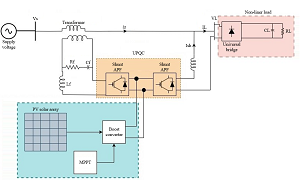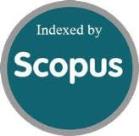Influence of Grid Integration of UPQC with Solar Power on Power Quality
DOI:
https://doi.org/10.46604/peti.2024.13617Keywords:
power quality, PV system, unified power quality conditioner (UPQC), fuzzy logic controller (FLC), maximum power point tracking (MPPT)Abstract
To satisfy the expanding usage of power electronics in grid-integrated applications, an unified power quality conditioner (UPQC) is regarded as an effective power tool contributing to power quality issues. Voltage interruption problems remain unresolved even if UPQC handles current harmonics and voltage sag/swell. This study proposes a solar energy-based UPQC to export active power to the grid. The suggested method utilizes photovoltaic (PV) power for power quality management and a boost converter to send the remaining active power back into the grid. The PV-UPQC configuration’s operation is simulated using MATLAB/Simulink. The PV-UPQC system can compensate for resultant harmonics, correct voltage sags, swells, and the maintenance of load voltage at its nominal value in addition to actively supplying the power grid. A considerable decline is observed in the THD of the load current from 104.66% to 2.56%. Conversely, a 97.55% decrease in load current THD is achieved.
References
P. Ray, P. K. Ray, and S. K. Dash, “Power Quality Enhancement and Power Flow Analysis of a PV Integrated UPQC System in a Distribution Network,” IEEE Transactions on Industry Applications, vol. 58, no. 1, pp. 201-211, January-February 2022.
Y. Bouzelata, E. Kurt, R. Chenni, and N. Altın, “Design and Simulation of a Unified Power Quality Conditioner Fed by Solar Energy,” International Journal of Hydrogen Energy, vol. 40, no. 44, pp. 15267-15277, November 2015.
S. K. Dash, P. K. Ray, and G. Panda, “DS1103 Real-Time Operation and Control of Photovoltaic Fed Unified Power Quality Conditioner,” IEEE Region 10 Conference (TENCON), pp. 3424-3428, November 2016.
S. Devassy and B. Singh, “Design and Performance Analysis of Three-Phase Solar PV Integrated UPQC,” IEEE Transactions on Industry Applications, vol. 54, no. 1, pp. 73-81, January-February 2018.
P. K. Ray, S. K. Dash, S. Mishra, and G. H. Beng, “UPQC-PV solving Power Quality issues based on system Generator FPGA controller,” IEEE 1st International Conference on Power Electronics, Intelligent Control and Energy Systems, pp. 1-6, July 2016.
R. Rudraram, S. Chinnathambi, and M. Mani, “PV Integrated UPQC with Intelligent Control Techniques for Power Quality Enhancement,” International Journal of Electrical and Electronics Research, vol. 11, no. 1, pp. 202-212, January-March 2023.
M. Hosseinpour, A. Dastgiri, and M. Shahparasti, “Design and Analysis of a Power Quality Improvement System for Photovoltaic Generation Based on LCL-Type Grid Connected Inverter,” International Journal of Engineering, vol. 37, no. 2, pp. 252-267, February 2024.
P. K. Pathak, S. Padmanaban, A. K. Yadav, P. A. Alvi, and B. Khan, “Modified Incremental Conductance MPPT Algorithm for SPV-Based Grid-Tied and Stand-Alone Systems,” IET Generation, Transmission & Distribution, 16, no. 4, pp. 776-791, February 2022.
K. Bhavya, P. V. V. Rama Rao, and L. Ravi Srinivas, “Performance Evaluation of Weighted Feedback Based UPQC Under Various Power Quality Issues,” International Journal of Engineering, vol. 36, no. 3, pp. 441-449, March 2023.
N. Kumarasabapathy and P. S. Manoharan, “MATLAB Simulation of UPQC for Power Quality Mitigation Using an Ant Colony Based Fuzzy Control Technique,” The Scientific World Journal, vol. 2015, article no. 304165, 2015.
A. Y. Qasim, F. R. Tahir, and A. N. B. Alsammak, “Voltage Sag, Voltage Swell and Harmonics Reduction Using Unified Power Quality Conditioner (UPQC) Under Nonlinear Loads,” Iraqi Journal for Electrical and Electronic Engineering, vol. 17, no. 2, pp. 140-150, December 2021.
M. A. Mansor, K. Hasan, M. M. Othman, S. Z. B. M. Noor, and I. Musirin, “Construction and Performance Investigation of Three-Phase Solar PV and Battery Energy Storage System Integrated UPQC,” IEEE Access, vol. 8, pp. 103511-103538, 2020.
A. Th. Mohammad and Z. S. Al-Sagar, “PV Solar Panel Performance in Iraq Using Matlab,” Diyala Journal of Engineering Sciences, vol. 10, no. 2, pp. 86-93, June 2017.
C. R. Algarín, J. T. Giraldo, and O. R. Álvarez, “Fuzzy Logic Based MPPT Controller for a PV System,” Energies, vol. 10, no. 12, article no. 2036, December 2017.
A. Asnil, R. Nazir, K. Krismadinata, and M. Nasir Sonni, “A Review of Partial Shading MPPT Algorithm on Speed, Accuracy, and Cost Embedded,” Diyala Journal of Engineering Sciences, vol. 16, no. 1, pp. 1-14, March 2023.
S. Talal Bahar and Y. G. Rashid, “A Study on An MPPT Control Approach Using Artificial Intelligence and the Perturb and Observe Method,” Diyala Journal of Engineering Sciences, vol. 17, no. 2, pp. 131-143, June 2024.
M. Rupesh and T. S. Vishwanath, “Intelligent Controllers to Extract Maximum Power for 10 kW Photovoltaic System,” International Journal of Engineering, vol. 35, no. 4, pp. 784-793, April 2022.
S. V. Ananth and S. Singaravelu, “Modelling and Simulation of MPPT Based Solar Photovoltaic System for Voltage Lift LUO Converter,” International Journal of Electrical and Electronics Research, vol. 11, no. 1, pp. 90-96, January-March 2023.
P. R. Kareem, “Simulation of the Incremental Conductance Algorithm for Maximum Power Point Tracking of Photovoltaic System Based on Matlab,” Diyala Journal of Engineering Sciences, vol. 12, no. 1, pp. 34-43, March 2019.
I. K. Abdul-Razzaq, M. M. F. Sakr, and Y. G. Rashid, “Comparison of PV Panels MPPT Techniques Applied to Solar Water Pumping System,” International Journal of Power Electronics and Drive System, vol. 12, no. 3, pp. 1813-1822, September 2021.
X. Li, H. Wen, Y. Hu, and L. Jiang, “A Novel Beta Parameter Based Fuzzy-Logic Controller for Photovoltaic MPPT Application,” Renewable Energy, vol. 130, pp. 416-427, January 2019.
M. Y. Baramadeh, M. A. A. Abouelela, and S. M. Alghuwainem, “Maximum Power Point Tracker Controller Using Fuzzy Logic Control with Battery Load for Photovoltaics Systems,” Smart Grid and Renewable Energy, vol. 12, no. 10, pp. 163-181, October 2021.
U. Yilmaz, A. Kircay, and S. Borekci, “PV system Fuzzy Logic MPPT Method and PI Control as a Charge Controller,” Renewable and Sustainable Energy Reviews, vol. 81, part 1, pp. 994-1001, January 2018.
P. K. Pathak and A. K. Yadav, “Fuzzy Assisted Optimal Tilt Control Approach for LFC of Renewable Dominated Micro-Grid: A Step towards Grid Decarbonization,” Sustainable Energy Technologies and Assessments, vol. 60, article no. 103551, December 2023.
K. Sahel Hanane, L. Abderrazak, R. Adlene, A. Mohamed, and K. Mohamed, “Fuzzy Logic Control of Maximum Power Point Tracking Controller in an Autonomous Hybrid Power Generation System by Extended Kalman Filter for Battery State of Charge Estimation,” International Journal of Engineering, vol, 36, no. 2, pp. 199-214, February 2023.
V. R. Kota and S. Vinnakoti, “Performance Evaluation of UPQC Under Nonlinear Unbalanced Load Conditions Using Synchronous Reference Frame Based Control,” Journal of The Institution of Engineers (India): Series B, vol. 99, no. 1, pp. 37-48, February 2018.
IEEE Recommended Practices and Requirements for Harmonic Control in Electrical Power Systems, IEEE Standard 519, 1992.

Published
How to Cite
Issue
Section
License
Copyright (c) 2024 Yasir Ghazi Rashid, Raghad Ali Mejeed, Ali Najim Abdullah

This work is licensed under a Creative Commons Attribution-NonCommercial 4.0 International License.
Submission of a manuscript implies: that the work described has not been published before that it is not under consideration for publication elsewhere; that if and when the manuscript is accepted for publication. Authors can retain copyright of their article with no restrictions. Also, author can post the final, peer-reviewed manuscript version (postprint) to any repository or website.

Since Oct. 01, 2015, PETI will publish new articles with Creative Commons Attribution Non-Commercial License, under The Creative Commons Attribution Non-Commercial 4.0 International (CC BY-NC 4.0) License.
The Creative Commons Attribution Non-Commercial (CC-BY-NC) License permits use, distribution and reproduction in any medium, provided the original work is properly cited and is not used for commercial purposes







